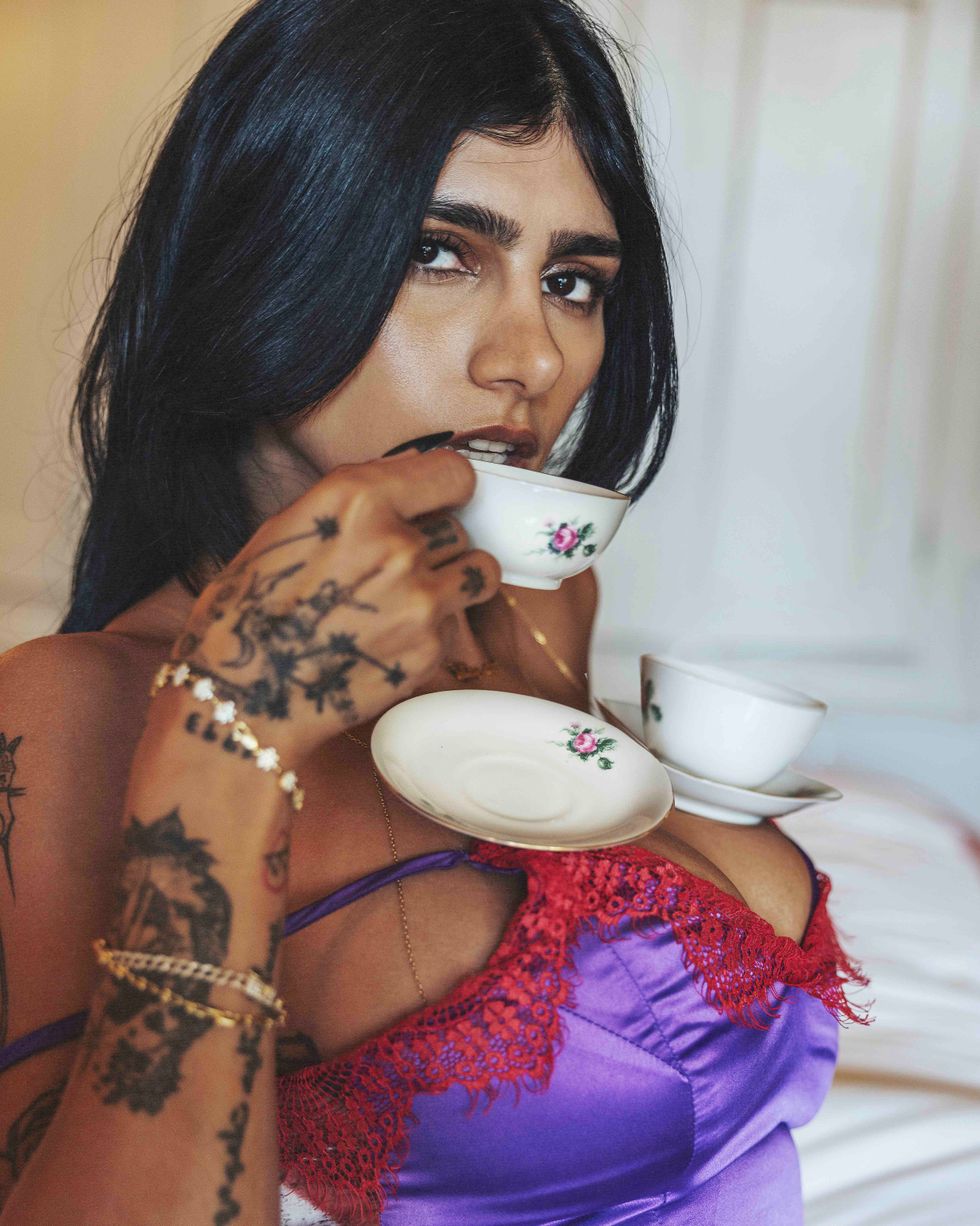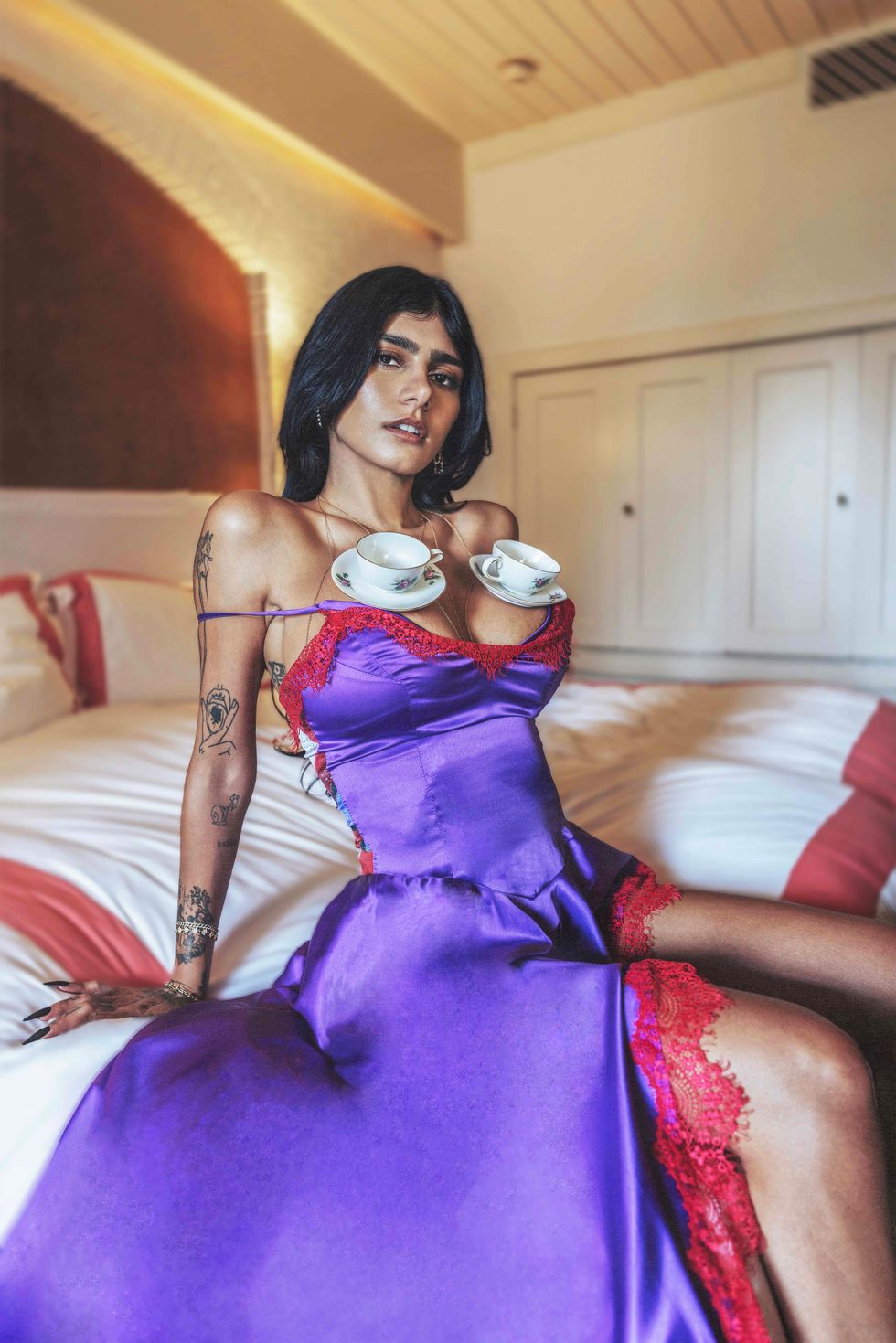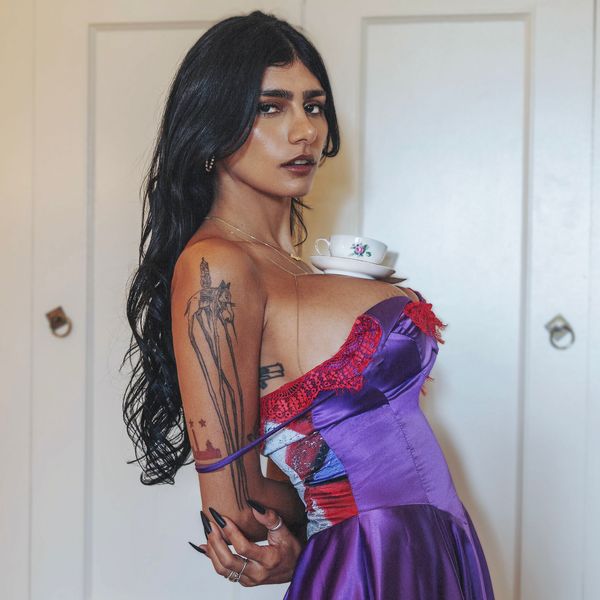
Mia Khalifa on Slow Factory’s ‘Everything Is Political’ Launch
By Joan Summers
Nov 07, 2024Slow Factory has become a foundational resource on social media for the voices of Palestinians, voices of resistance and displaced people worldwide. The platform’s distinct visual communication style is inextricably linked with its mission to combat mainstream narratives about oppression and violence. Céline Semaan, the pioneering founder of Slow Factory, wants to change “harmful narratives popularized and promoted in mainstream media,” which she jokes has become something of an Olympic sport.
Semaan tells PAPER, of the platform’s visual language: “It’s an art of communication we aren’t taught at school. We learn to adapt to every viral post. We know that when our design framework becomes everyone else’s framework, that it’s time to change things up because sometimes when the mainstream catches up to things, it often waters it down.”
Following on the growth of Slow Factory, Semaan and team have launched Everything Is Political, a magazine inspired in partly by the team feeling “completely ostracized from mainstream media” for championing Palestinians. “Since October 2023, our stories, perspectives and voices started to be erased as a rise in McCarthyism was adopted. Anyone talking about Palestine risked their jobs, their awards and their features. Slow Factory wanted to create a space in the media to celebrate us as humans, as creatives and as professionals,” Semaan says. “As part of our media justice work, we wanted to counter the rise in dehumanization of Arab, Indigenous and Black folks who are calling for collective liberation.”
EIP’s first cover star is Mia Khalifa, a model and activist who has faced ongoing censorship and outrage online for her unabashed support of Palestinians and more. Khalifa, shot by Elizabeth De La Piedra for the cover, tells PAPER of her hopes for the magazine: “We are subject to everybody's terms, and until we make our own terms of service, then we're going to continue to get censored because it's out of our hands. If they can do it, then we need to also.”
Semaan says that, even in times of violence and oppression, writing and art serve an important function: “It is an important act of both defiance and resistance. To document our lives, our realities, our stories and culture while we are being actively exterminated is important.”
For more on Slow Factory, Khalifa’s ongoing efforts to fundraise and organize, the contents of the issue and more, read our full interview below.
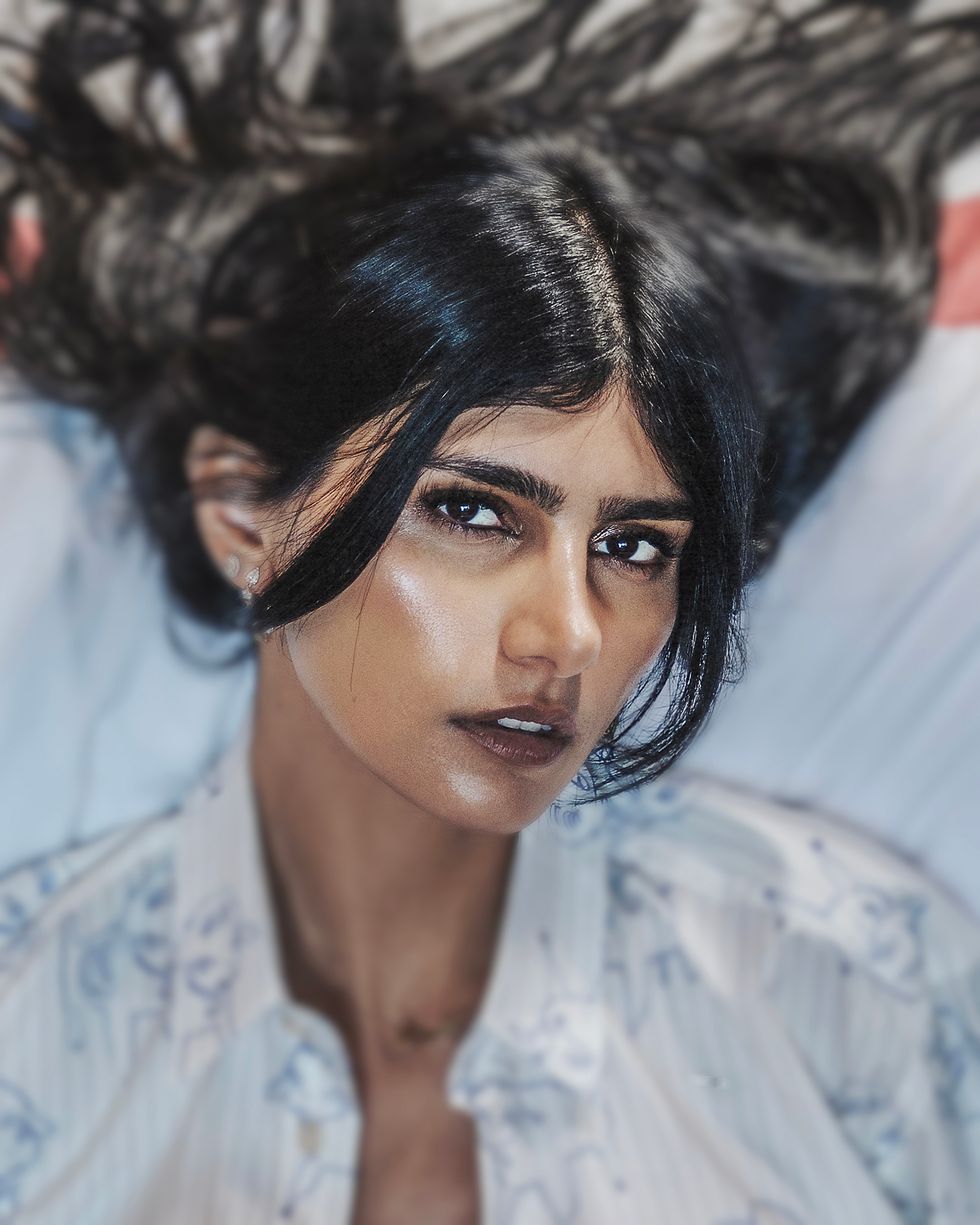
Slow Factory has felt integral in amplifying the voices of displaced people, and currently with the ongoing violence in Palestine, Lebanon and beyond. What have you learned, using a platform like Instagram and visual imagery, to communicate ideas around resistance and liberation? Especially in a moment that feels this dire and urgent.
Céline: We need to constantly collaborate both offline and online and reframe our wording, refresh our own descriptions and make room for newcomers without alienating folks who want us to push harder. It’s a constant dance, sometimes a battle, and is not for the faint of heart. The pressure of communicating with 40 million people daily is a huge responsibility, and even though we feel overwhelmed or unable to slow down, we must always take time to gain new perspectives in order to cut through the noise of misinformation without the “meme-ification” of our struggle.
How did the idea for Everything Is Political first come about?
Céline Semaan: Slow Factory has always advocated that “everything is political” in various ways throughout our 12 years of work. The moment it became most relevant was in the summer of 2021, during an ongoing wave of assaults on Gaza where everyone was trying to be apolitical, despite all the promises and “awakenings” after the murder of George Floyd and height of the Black Lives Matter movement the summer prior.
We thought we should do something to destigmatize the idea that someone can be “too political,” because everything is political. So we bought the domain name, surprised it was even available in “.com.” Liberal mindset has popularized the major misunderstanding that being silent and apolitical is safer for professionals in their careers. While that used to work, in 2020, it wasn’t working anymore. People slowly realized that being silent in the face of injustice is political, and it positions you on the side of oppression. EIP wants to change that by offering folks ways to align with their values through political education they won’t teach you at school but is needed for our collective civic engagement.
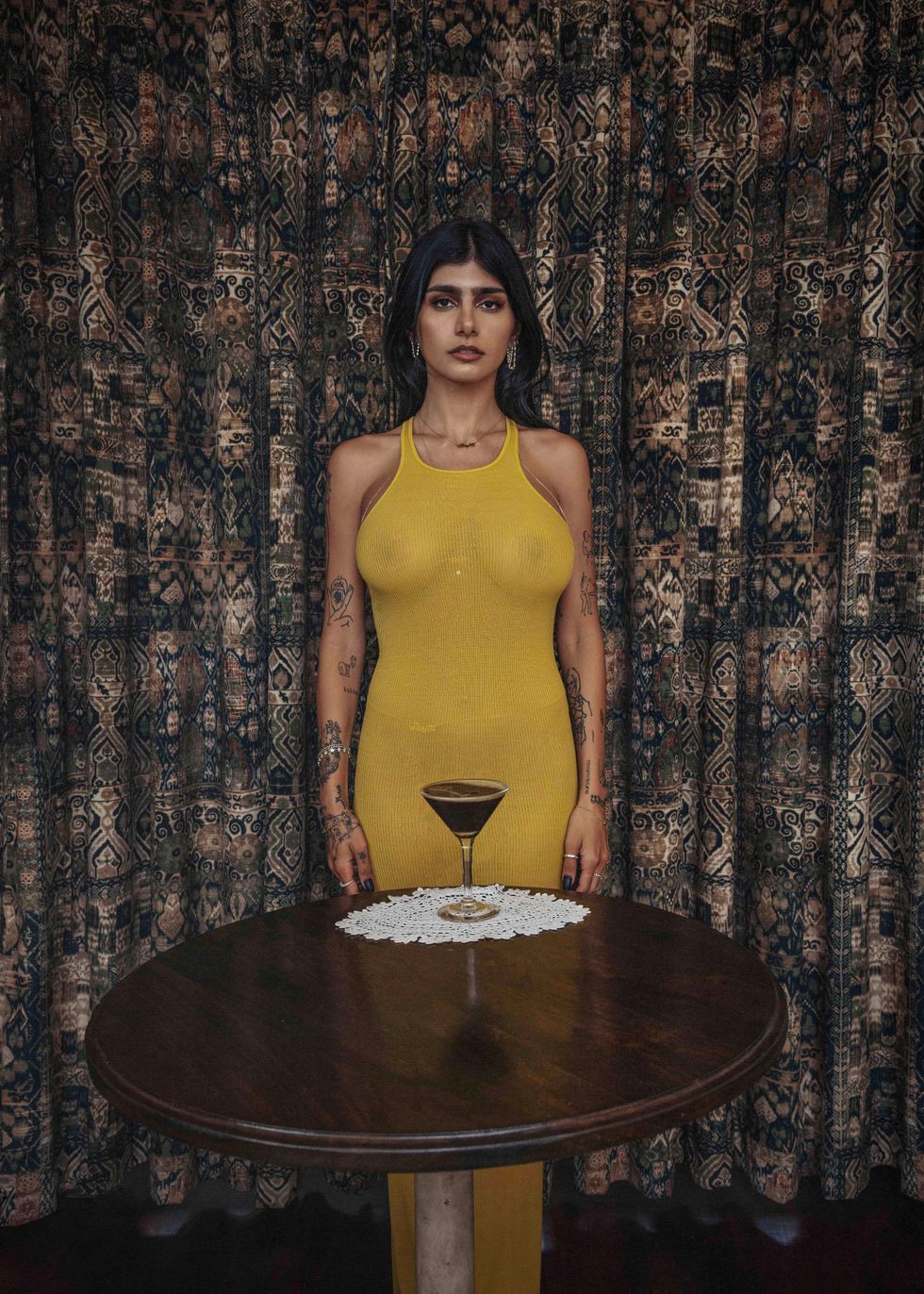
Céline, you recently published your first book, A Woman Is a School, through Slow Factory’s imprint. Congratulations! What do you hope for the future of the imprint, and do you see Slow Factory continuing to expand itself into other media?
Céline: Everything Slow Factory has ever designed has been out of necessity, as a way to adapt to the times. We decided to start the Books for Collective Liberation imprint to publish our stories: discredited stories from Lebanon, Palestine and purposefully erased regions of the Global South. Though we had published a few things before such as “Applied Utopia” and “Planet Justice” (both printed matters with essays, designs and theories on radical imagination, collective liberation and applying new systems to a broken wounded world), A Woman Is a School is the first nonfiction book, memoir and cultural theory that opens the door for more books in that vein. We have started writing a TV show, called Connecting the Dots, that we plan on working on in the next few years. Apart from our imprint, media platform and narrative works, we believe that it is our duty as artists to respond to the times and to make collective liberation accessible.
Mia, I read your recent interview with The New York Times, and you can feel the outlet’s hesitation to engage with you on the subject of Palestine through the page. Do you feel there is a clear need for platforms like Slow Factory or EIP, in a climate so eager to censor, sidestep or outright ignore?
Mia Khalifa: Absolutely. It was born out of that necessity because there is no place where we don't encounter censorship — not at The New York Times, not on Twitter, not on Instagram. We are subject to everybody's terms, and until we make our own terms of service, then we're going to continue to get censored because it's out of our hands. If they can do it, then we need to also. I actually made a joke during my interview because I called it a genocide, and then I was interrupted at one point [by the interviewer], for them to note, "any opinions expressed by guests are their own..." There had to be a caveat there. I coughed, and I was like, “That's just so you won't get fired.”
Mia, you were also the first anchor donor of Slow Factory’s Fund for Collective Liberation. You said in your announcement post that the decision to announce earlier than intended was, in part, motivated by Israel’s escalating violence in Lebanon, to help “slow the factories of oppression.” Do you have any immediate goals or hopes for that funding?
Mia: The reason that I am so confident putting my money here is because that's the one thing I do not have to worry about: where the money is being used and how it's being used. I am so confident that it's being used in every way that it's needed, as it changes every single day. I feel like it's such a broad spectrum of things that need to be covered, things that need to be changed, things that need awareness brought to them. And Slow Factory is just on it every single day. I'm even learning something new from the way they present information. The way that they frame things is so digestible and framed perfectly. Because in a world of over-information and misinformation, we have to make sure that we are getting straight to the point so that we don't lose anyone in anything other than facts. Once you find the right place to support, one that you trust unconditionally, the only thing I think about is how can I support more? How can I support better?
Every day it's something different. Every day it's a new country. Every day it's a new group of oppressed people. Hopefully, there will be a day when there is peace, and there isn't a need to continue to continue that work, but there will always be a need to continue funding arts and culture. That's the adaptability that we need in an organization: one that oversees every single part of the preservation of a culture and of a [group of] people. And that doesn't just mean saving them. It means supporting and amplifying their voices.
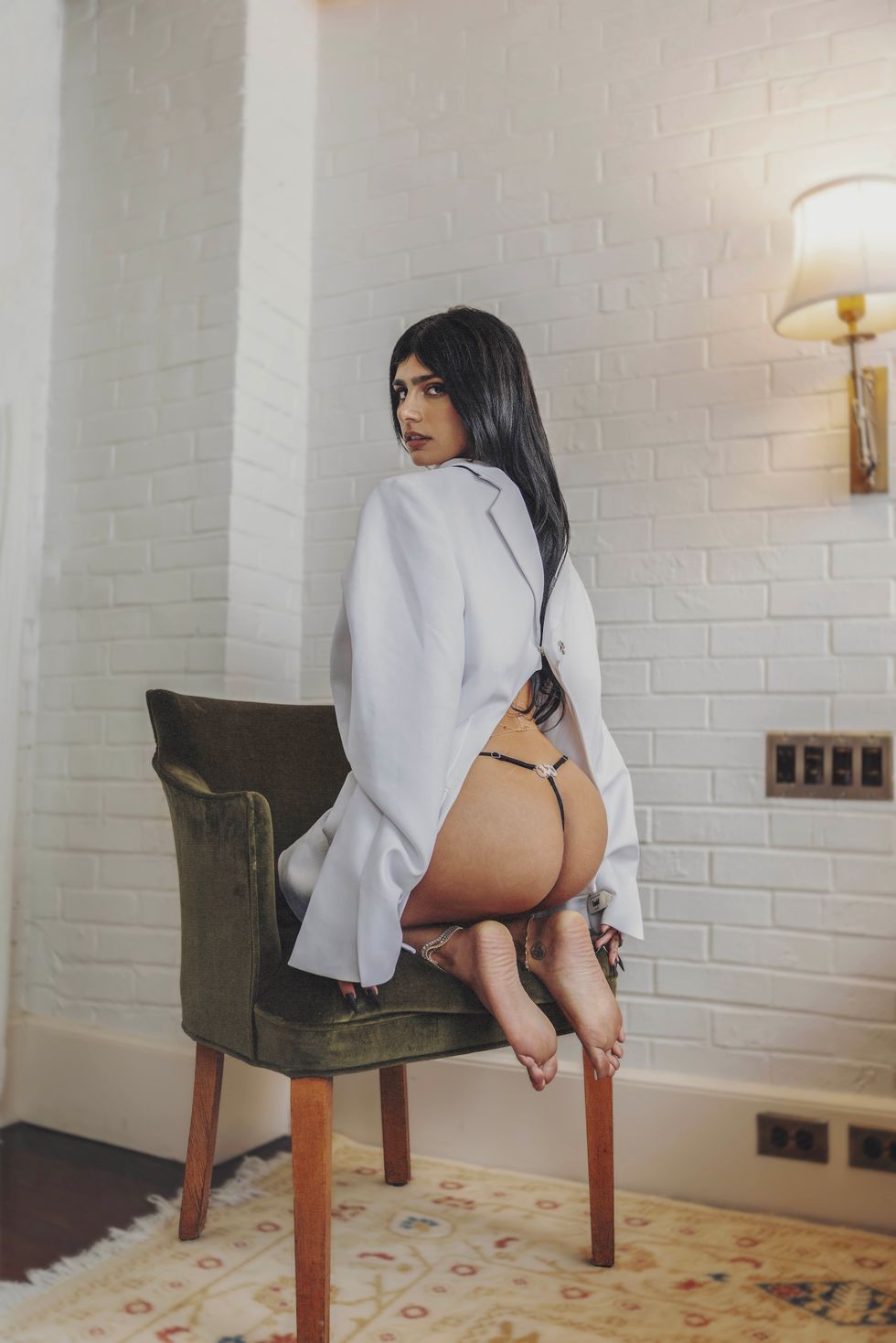
I’d like to talk about the gorgeous cover photos from the second issue. Can you walk us through the creative process behind them, and some of the inspiration you had coming into the shoot?
Céline: Paloma Rae on our leadership team suggested we work with Elizabeth De La Piedra for Mia Khalifa and the two of them hit it off so beautifully! When we walked into Mia's room after the shoot, we could feel the joy, the playfulness and the chemistry between the two of them. It felt maktoub, written in the stars.
Mia: A friend just came over and we took some pictures and smoked weed on the floor of a hotel bathroom. It was so easy and fluid. It was so incredible. She has a vision where she shows me a couple inspiration photos, and we execute it within five minutes and move on. I think that the reason that we got so many photos is because after every look, we were all just so excited by the work that was produced that we were like, “Yes, let's do more! Let's go.” There was some David Sims inspiration. There were some Victorian corsets. Like, it was all over the place. It was just very reflective of her creativity. I loved being her little doll that day.
Céline: You and her styled the shoot with your clothing, right?
Mia: Exactly. I just pulled some of the clothes that I love from my closet, and it worked so perfectly. It made me love my own pieces so much more the way that she saw them and wanted to place them.
Can you give readers a preview of what they can expect from the issue, and EIP as a whole?
Céline: There’s a very intimate interview between Mia Khalifa and myself, where we’re in bed as if during a sleepover, where we get to dive deeper into each other’s realities as women, as Lebanese women and as public facing women. We talk about our journey thus far, healing and our heartache for our country. In this issue there’s an interview with Lina Soualem about her film Bye Bye Tiberias, which portrays life in occupied Palestine and the stories Hiam Abbas, her mother, shares about her life and her journey as an artist. It’s a brilliant film, and the interview is very intimate as well and explores the power of culture and of us as artists during this genocide against our people.
Stories from Gaza are collected in an ongoing documentation we call “Gaza Files.” We explore the expansionist goals of “Greater Israel” in an article by Sarah Sinno that’s designed by Daleen Saah and feature an interview between Maya Finoh and Tarteel Al Imam about the realities of the genocide in Sudan. There’s also a powerful photo essay by Yumna Al Arashi about cannabis farming in the Bekaa valley in Lebanon. This is particularly urgent to document since the Israeli occupation has been flattening that rich agricultural region for the past month.
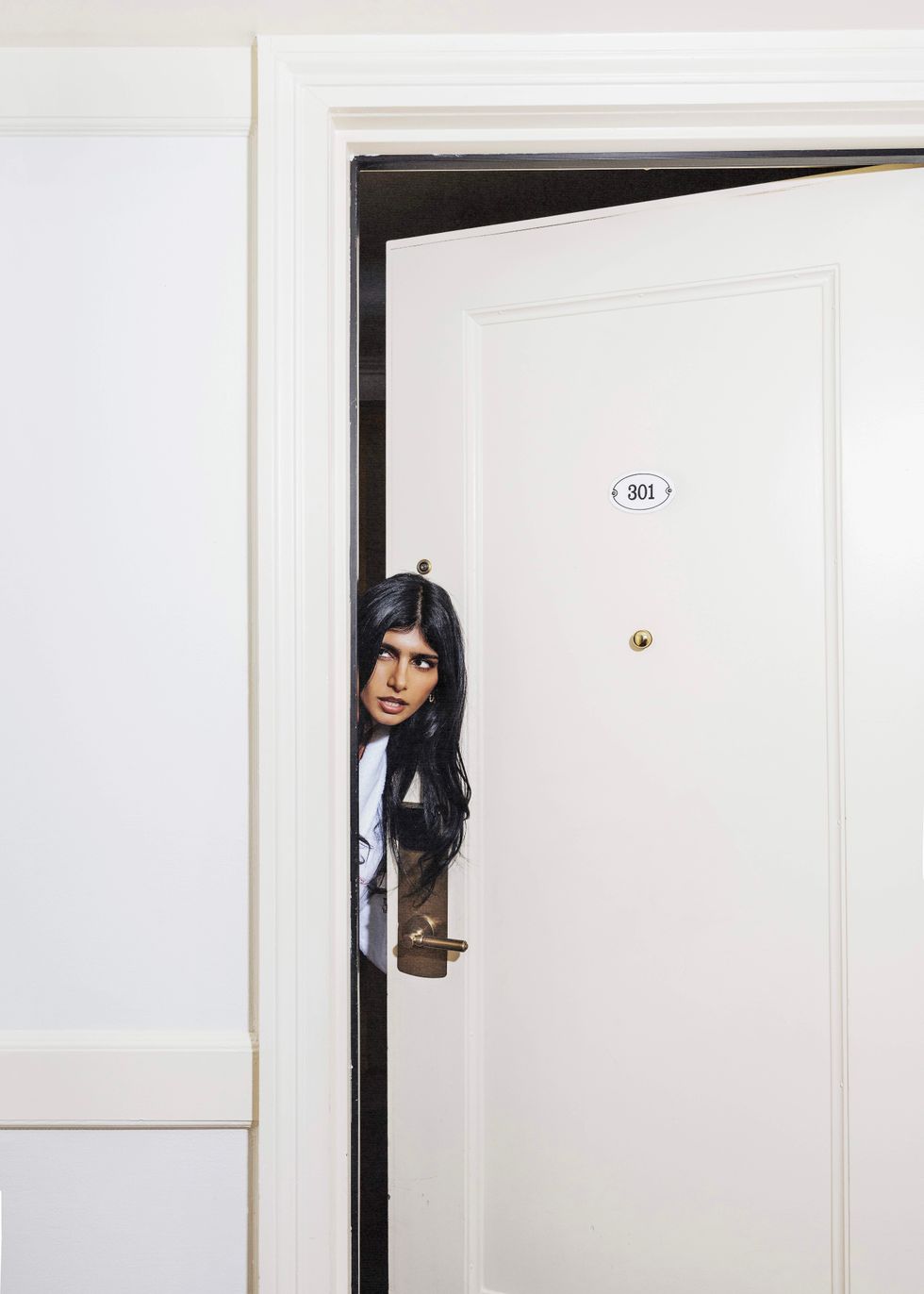
Often, when art or writing is produced in moments of intense violence and oppression, people, usually observers, find themselves waving off the effort as frivolous or unnecessary. How do you both feel about that mindset, or do you pay it any mind at all?
Céline: It is an important act of both defiance and resistance. To document our lives, our realities, our stories and culture while we are being actively exterminated is important. Many throughout history have held this role. Everyone has a role in our collective liberation. The artist's role, however, is one that is often discredited and mocked, though it is the very role that reminds us collectively of our humanity.
Mia: That is something that weighs so heavy on me. After my post announcing being the anchor donor for Slow Factory's Fund for Collective Liberation, I felt frivolous posting anything else. But I loved what Céline said about how we need to showcase Arab smiles and happiness and joy. That has actually been replaying in my head every single time my anxiety takes over and says, “No, don't post,” because it's so fucking true. We still need to feel joy and create joy and forge it. Even if it feels like there's nothing to be joyful about, we need to create it.
It's a nod to the fact that we cannot be stopped. You cannot kill our spirit. It doesn't matter where in the world, whether in Lebanon or outside of Lebanon. Even though we're mourning for our culture and our people and our friends and our humanity in general, we still need to forge joy.
Mia and Celine, what lessons can you share with others looking to use their platforms to amplify voices of resistance, or fight for liberation, whether here in the West or globally?
Céline: Find the courage in yourself to be disliked. Have a clear connection with your righteous right to exist and demand that others, too, have a right to exist sovereign and free from occupation. Learn and unlearn constantly, and most importantly, channel your anger not to lash out on your peers, but to internally transform the creative expression of your freedom and liberation.
Mia: The lesson that I've learned is that sometimes it's better to wait and really gather your thoughts and make sure that it's as eloquent as possible. Because, like you've said before, we [Arabs] have zero room for error. We cannot be emotional, we cannot be insulting, we cannot be any of these things, because then we are written off as the "children of darkness" or as "animals" or whatever they're painting us as. We have to go a step beyond to not be a distraction so that we're actually able to convey the message we want.
I'm still learning my lesson as I go because I am extremely emotional, and I can be a little bit erratic when I feel strongly enough about something, but I really want to be better at that. I want to be better at controlling myself so that I can drive my point more eloquently. Because there's so much propaganda being spewed out from the other side, we have to make sure that we are as level headed as possible so that the facts come across.
Photography: Elizabeth De La Piedra for Slow Factory, Everything is Political
From Your Site Articles
Related Articles Around the Web
MORE ON PAPER
ATF Story
Madison Beer, Her Way
Photography by Davis Bates / Story by Alaska Riley
Photography by Davis Bates / Story by Alaska Riley
16 January
Entertainment
Cynthia Erivo in Full Bloom
Photography by David LaChapelle / Story by Joan Summers / Styling by Jason Bolden / Makeup by Joanna Simkim / Nails by Shea Osei
Photography by David LaChapelle / Story by Joan Summers / Styling by Jason Bolden / Makeup by Joanna Simkim / Nails by Shea Osei
01 December
Entertainment
Rami Malek Is Certifiably Unserious
Story by Joan Summers / Photography by Adam Powell
Story by Joan Summers / Photography by Adam Powell
14 November
Music
Janelle Monáe, HalloQueen
Story by Ivan Guzman / Photography by Pol Kurucz/ Styling by Alexandra Mandelkorn/ Hair by Nikki Nelms/ Makeup by Sasha Glasser/ Nails by Juan Alvear/ Set design by Krystall Schott
Story by Ivan Guzman / Photography by Pol Kurucz/ Styling by Alexandra Mandelkorn/ Hair by Nikki Nelms/ Makeup by Sasha Glasser/ Nails by Juan Alvear/ Set design by Krystall Schott
27 October
Music
You Don’t Move Cardi B
Story by Erica Campbell / Photography by Jora Frantzis / Styling by Kollin Carter/ Hair by Tokyo Stylez/ Makeup by Erika LaPearl/ Nails by Coca Nguyen/ Set design by Allegra Peyton
Story by Erica Campbell / Photography by Jora Frantzis / Styling by Kollin Carter/ Hair by Tokyo Stylez/ Makeup by Erika LaPearl/ Nails by Coca Nguyen/ Set design by Allegra Peyton
14 October
